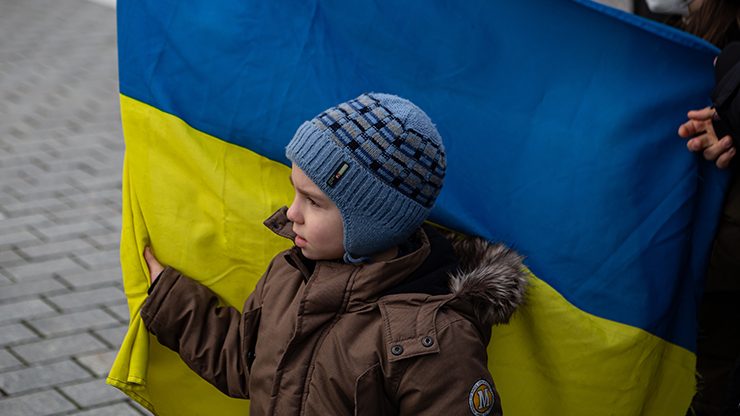
Our expert on the United Nations and European Union explains how global decisions made in response to the Russian invasion of Ukraine will affect future decades. The insights from Katie Laatikainen, PhD, professor and acting chair of political science, are compelling.

Katie Laatikainen, PhD
Russia’s invasion of Ukraine in February 2022 initiated the largest military conflict in Europe since World War II. It also inspired swift condemnation from around the world and severe economic sanctions from Western countries. For insight into the long-term consequences of Russia’s actions and its impact on international relations, we talked with Katie Laatikainen, PhD, professor and acting chair of the Department of Political Science.
What Concerns You the Most About the Actions that the Russians Have Taken So Far?
Suddenly we’re thrust back into all of the nuclear strategy from the 1980s, the big international security issues, like mutually assured destruction. The interesting thing is it’s different this time, because mutually assured destruction assumes that both sides act rationally. And it’s not entirely clear to me right now that Putin is acting rationally.
So Putin’s Mental State Makes this Situation Different From Those Encountered During the Cold War?
Yes. In international relations, we talk about broader structures that explain what’s happening in world affairs; we look at national interests and whether actions advance those interests or damage them. We rarely talk about the individual leader because the broader geopolitical dynamics are assumed to be larger than one person. But to a person, all the international relations scholars I have spoken with are wondering what is going on with Putin. I find that quite striking, and that concerns me the most, because this situation is so much more unpredictable. It is deeply uncomfortable to be focused on one leader’s idiosyncrasies, to think that they will determine what happens. We did not face that situation of questioning the rationality of a single international leader during the latter stages of the Cold War.
So There’s A Wild Card Here.
Yes, and leaving aside concerns about Putin not being rational, I worry about the possibility of an inadvertent engagement, with NATO reinforcements being deployed along frontline NATO states like Poland and Lithuania. Accidents happen in war. If Polish troops, as part of NATO, are killed by an errant Russian airstrike, there could be demands for retaliation on the part of NATO members. If that happens, does American respond? That’s a hard question. If we do, we could have an open war between Russia and the United States. If we don’t, then NATO would be seen as weak, which is deeply damaging. So it’s very challenging.
What Challenges Do Putin’s Actions Present to the World Order?
NATO is most challenged by this because it’s a collective defense organization, and mutual security is its raison d’être. NATO is trying to reassure frontline member states that we are there for them. At the same time, it doesn’t want to be drawn into a fight to defend Ukraine, which is not a member of the alliance.
The European Union, on the other hand, has been working for several years towards deepening its strategic profile, and it has something called permanent structured cooperation. It’s often soft security or alternative security rather than the heavy lifting NATO does. This past week, there’s been more change in the EU’s approach to security than there has been for the past 30 years. It’s been stunning.
How Has the EU’s Approach to Security Changed?
The Germans have made a major transition in their position, taking a much more forceful position than they traditionally have. The invasion of Ukraine has energized the European Union. This has emboldened them and given them a new purpose. While the EU doesn’t have its own army, it has approved funding for member states that are channeling weapons to Ukraine. That’s a pretty remarkable pooling of economic resources in support of Ukraine. If you’d told me at the beginning of this year that the EU would be doing something like this, I wouldn’t have been able to fathom it.
How Have the Events in Ukraine Affected the United Nations?
The U.S. has had to reengage in the United Nations. We have had to build a broader alliance. We can’t stop Putin by ourselves. I think it’s created a new appreciation, at least on the part of the United States, for the UN. On the other hand, the Russians have a veto in the Security Council. Most Americans think the only important thing in the UN is the actions taken by the Security Council. But the shifting of this international debate back into the General Assembly through the emergency session has been really important. That completely lopsided General Assembly vote on March 2 (141 yes, 5 no, 35 abstentions) on a resolution reprimanding Russia for aggression and demanding the withdrawal of its troops is really important, even if nonbinding.
Even Switzerland stopped being neutral. That’s incredible.
Given how clear a violation of the political independence and territorial sovereignty of a UN member state, the vote was a kind of no-brainer for most developing countries. I’m quite perplexed by India’s abstention, despite its long history of nonalignment. I think India is out of step with what’s happening here. But I think it’s good for the UN if there’s a little bit of political tension, because that makes the UN an important place.
How might the decisions made now or in the future affect the international order for decades to come?
There is an opportunity to rethink how the United States approaches international affairs. It’s a reset after hegemony. We’re not the sole superpower anymore. China is so powerful that we cannot, by force of our own capabilities, impose a vision on the world like we did in Iraq in 2003 without much greater pushback.
The United States was a moving force for the creation of the UN after World War II, but it has had an ambiguous relationship with the organization since the 1960s. We’re learning through this crisis that we have to work with others. There is new appreciation for the UN and its support of multilateralism, and recognition of the need for the U.S. to reengage with it.
So We’re Learning to be An International Team Player Again?
Yes. We have some astute people at the highest levels dealing with our policy right now. The Biden administration has done a pretty good job in managing this, lining up international support for imposing economic sanctions and arming Ukraine. The question is how long we can sustain it. A crisis can be an opportunity to change things. And I think that’s going to be one of the outcomes, that we see the U.S. form stronger partnerships and work with allies to address emerging challenges.
What Do You See As Some of the Key Challenges Ahead?
There’s a rise and spread of authoritarian forms of government. This is an ideological challenge to liberal democracy and Western ideals, which means the U.S. is finding it more and more important to engage multilaterally. Defending democracy means articulating why we think free markets and free political systems are the best way to organize political and cultural life in our society. We can’t assume others believe this. This relates to what has happened domestically, too, with the rise of populism. We have to be a little bit more humble about how we approach others who understand things in a different way. We have to cultivate rather than coerce.